On 7 September 2022, the British Chamber of Commerce Shanghai (BritCham Shanghai) held its 2nd Sustainability and ESG Summit at the PwC Innovation Centre, Shanghai. BritCham Shanghai Vice Chair, Ted Wan, and PwC’s Lead Partner – ESG Strategy, Steven Zhong, addressed welcome remarks.
UN Resident Coordinator in China, Siddharth Chatterjee, delivered a video message. British Consul-General Shanghai, Chris Wood; Director of Environmental Resources Division at Shanghai Municipal Development & Reform Commission, Mr GUO Jianli; Vice President at Shanghai United Assets and Equity Exchange Co., Ltd., Mr LV Weimin attended and delivered keynote speeches.
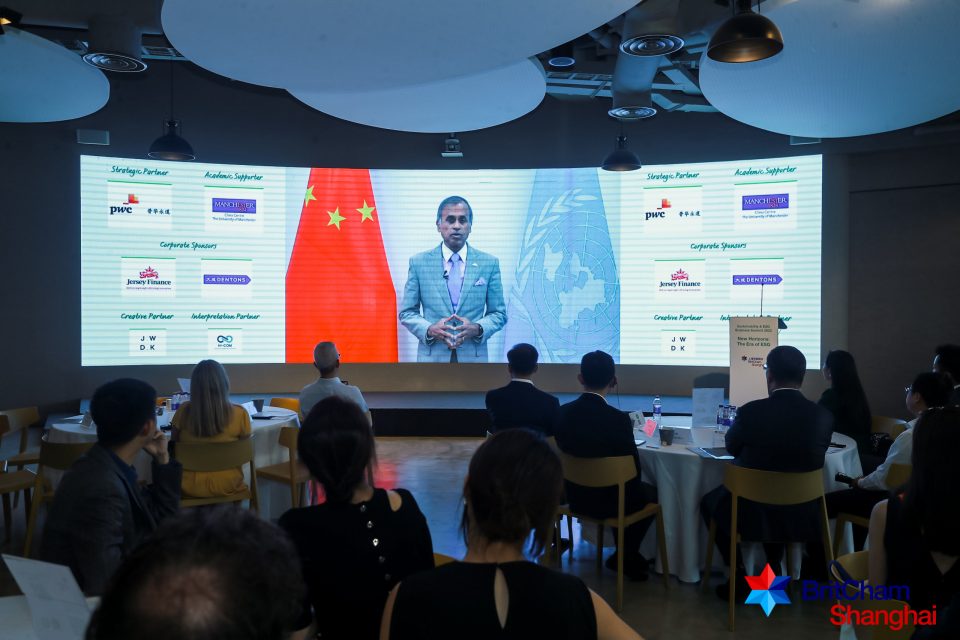
Siddharth Chatterjee delivered an opening keynote via video message, emphasising the importance of the ESG framework which allows companies and investors to understand how organisations can manage risks and opportunities around sustainability issues. Mr Chatterjee said,
“Looking beyond, the (ESG) risk management, adopting this lens in tandem with targets set by the Sustainable Development Goals, can be a driver for innovation and create long-term value for business and society. Global challenges require global solutions, found only through multilateralism. All sectors of society, including governments, the private sectors, civil society, and individuals, need to mobilise to confront challenges and realise the promise of the 2030 agenda was sustainable development. The United Nations will continue to encourage more multi-stakeholder partnerships to accelerate our global progress on the sustainable development rules. ”
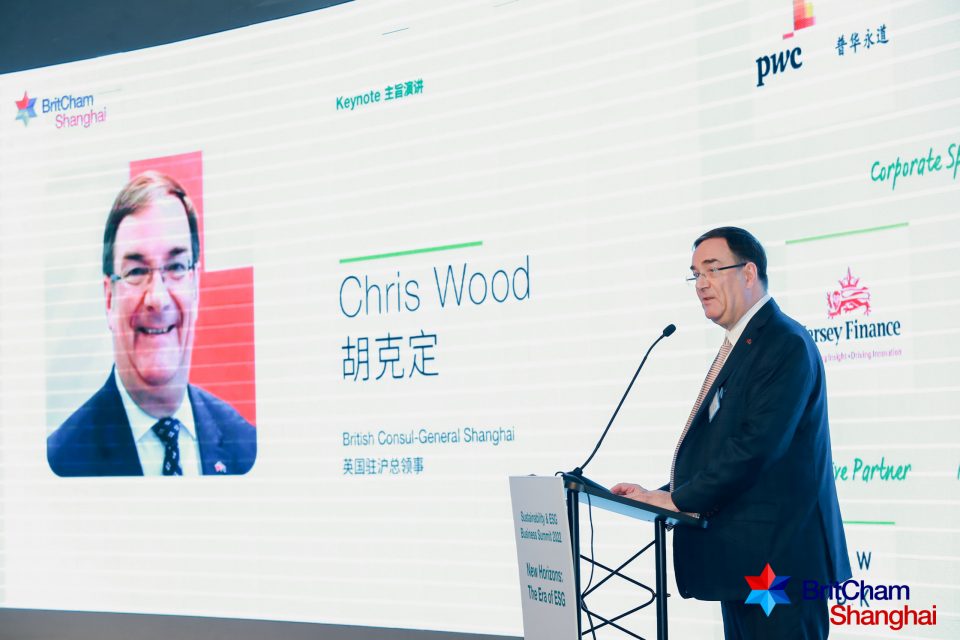
Chris Wood said in his speech,
“The UK government has continued to act as a global leader on climate policy. In 2021, UK was fortunate enough to be the host of the UN Climate Change Conference COP26, which brought parties together to accelerate action towards the goals of the Paris Agreement to limit global temperature rise to 1.5 degrees. During this summer, for example, the UK announced a new Minister-led taskforce which will help pension schemes address the risks and seize the opportunities of the ‘social’ element in ESG investing.
The UK and China already have long-standing collaboration through partnerships on green finance, climate risk and clean energy, and we will continue to work closely with China on climate issues.”
In recent years, Shanghai has attached great importance to “dual carbon” work, actively promoted the establishment of a “dual carbon” policy system and worked hard to create low carbon demonstrations. GUO Jianli shared with the audience the arrangements for Shanghai’s “dual carbon” work, focusing on the five most important areas of energy conservation and carbon reduction, namely energy, industry, buildings, transportation and the circular economy, and the three key support systems of scientific and technological innovation, market mechanisms and community participation.
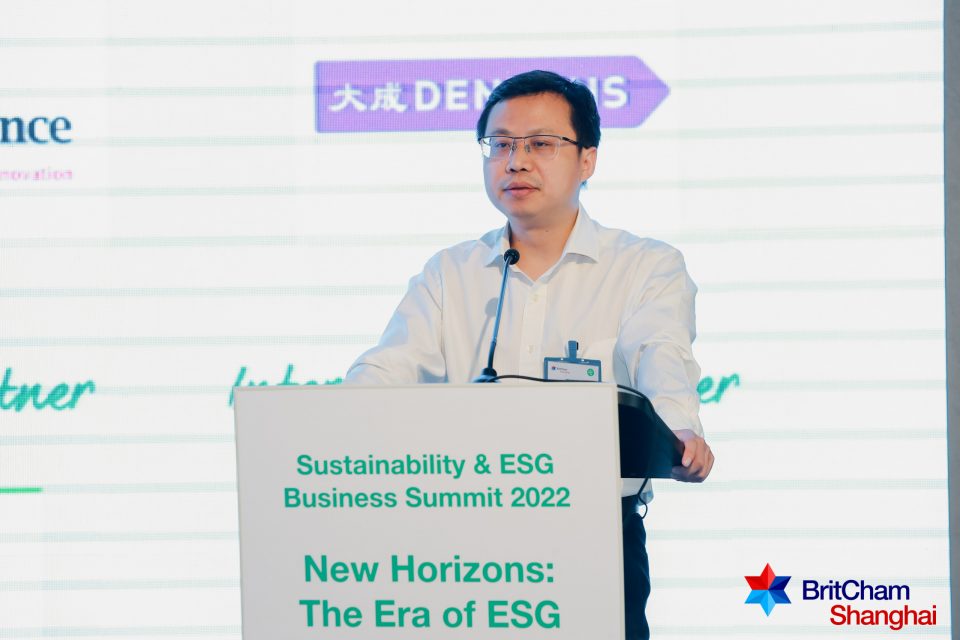
Mr GUO said,
“Shanghai is a mega city with a resident population of 25 million. It is not only a duty to follow the global development trend and explore green and low-carbon development, but also the necessary way to achieve sustainable and high-quality urban development.
In order to better promote the realisation of the 3060 dual-carbon target, Shanghai set up a working group last year to lead the work on peaking carbon dioxide emissions and achieving carbon neutrality. This July, the city issued the carbon peak and carbon neutral implementation opinions and Shanghai carbon peak implementation plan successively. At the same time, we are speeding up the formulation of specific action plans for eight key areas and regions and 13 supporting policy documents, including scientific and technological support and financial support. These documents will be released throughout the year.”
Shanghai United Assets and Equity Exchange (SUAEE) has fully implemented the business development strategy of “one body, two wings and multiple platforms”, and achieved good results in serving the deepening reform of state-owned assets and enterprises, the investment and financing needs of the real economy, the construction of Shanghai as international financial centre and science and innovation centre, while actively practising and advocating the ESG concept.
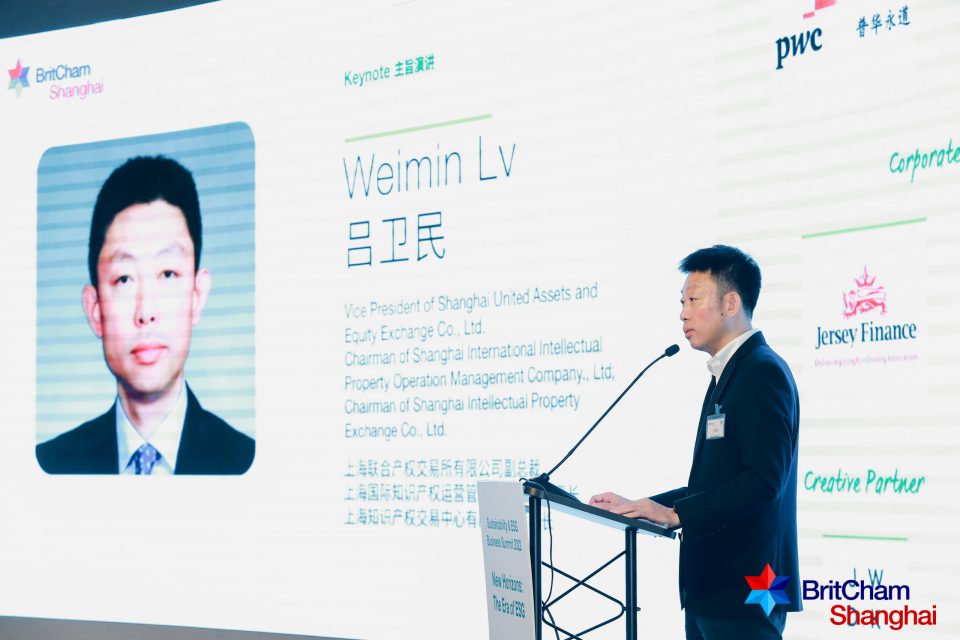
Mr LV said in his speech,
“SUAEE maintains a pioneering attitude, in the spirit of standardisation, specialisation and internationalisation, to practice its development strategy, focusing on three aspects: anchoring on the ‘double carbon’ target and comprehensively promoting the high-level construction of the national carbon market; serving the circulation of factors and helping market players better fulfil their social responsibilities; focusing on corporate governance and making efforts to enhance the vitality and development of enterprises.
We will actively promote the alignment of our businesses with the requirements of sustainable development and ESG concepts, accelerate the construction of an ESG system with Chinese characteristics, and make new contributions to the high-quality development of the economy and society.”
Representatives from the automotive, financial services and life-saving technology sectors presented keynotes on the topic of ‘Why is ESG important to businesses?’ . The speakers are Alexious Lee, CFO at Lotus Tech and Member and Vice Chairman of Lotus ESG Committee; Dr Eugene Qian, China Country Head at UBS AG and Chairman of UBS Securities Co. Ltd.; Aldous Wong, Global Executive Board Advisor, Chair and President of Asia Pacific at Halma plc.
In the second half of the summit, which focused more on micro and industry trends, experts from the British Embassy in Beijing, Climate Bonds Initiative (CBI), CDP China as well as other organisations and companies discussed and shared insights on ESG disclosure standards and how companies can implement them.
Guest speakers invited by Jersey Finance, The University of Manchester, Dentons and PwC discussed in-depth the topics of ESG for asset management and what ideal ESG performances look like to investors; New Energy, Net Zero Energy Future; Supply chain ESG compliance challenges faced by Chinese enterprises; Value Chain Collaboration. Unilever shared ESG best practices.
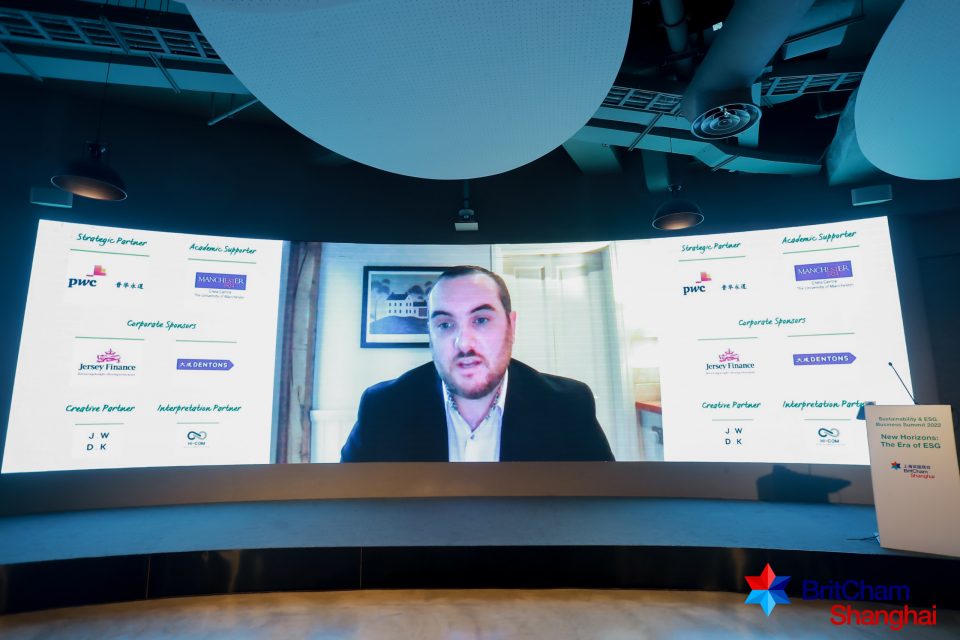
To conclude the Summit, BritCham Shanghai’s Executive Director James Dunn further emphasised the Chambers growing role in advancing international businesses’ sustainability efforts and ESG impact in China. James said,
“We support businesses through peer support and sharing of experience, knowledge and expertise; we endeavour to help to develop an eco-system of force for ESG best practices in China and the global market. One key initiative the Chamber is spearheading is the ESG China Awards. The Awards, open to both local and international businesses that operate in China, is a programme recognising and promoting excellence from companies that have made a positive ESG impact in China. Winners of each category will be announced at the end of October.”
The full-day summit was held both online and offline. During the one-day agenda, more than 30 speakers participated in nine keynotes and four panel discussions. Professional representatives from more than 200+ local and international enterprises, organisations and universities participated online and offline.
Please down the summit e-programme below to learn more about the agenda and speakers.
